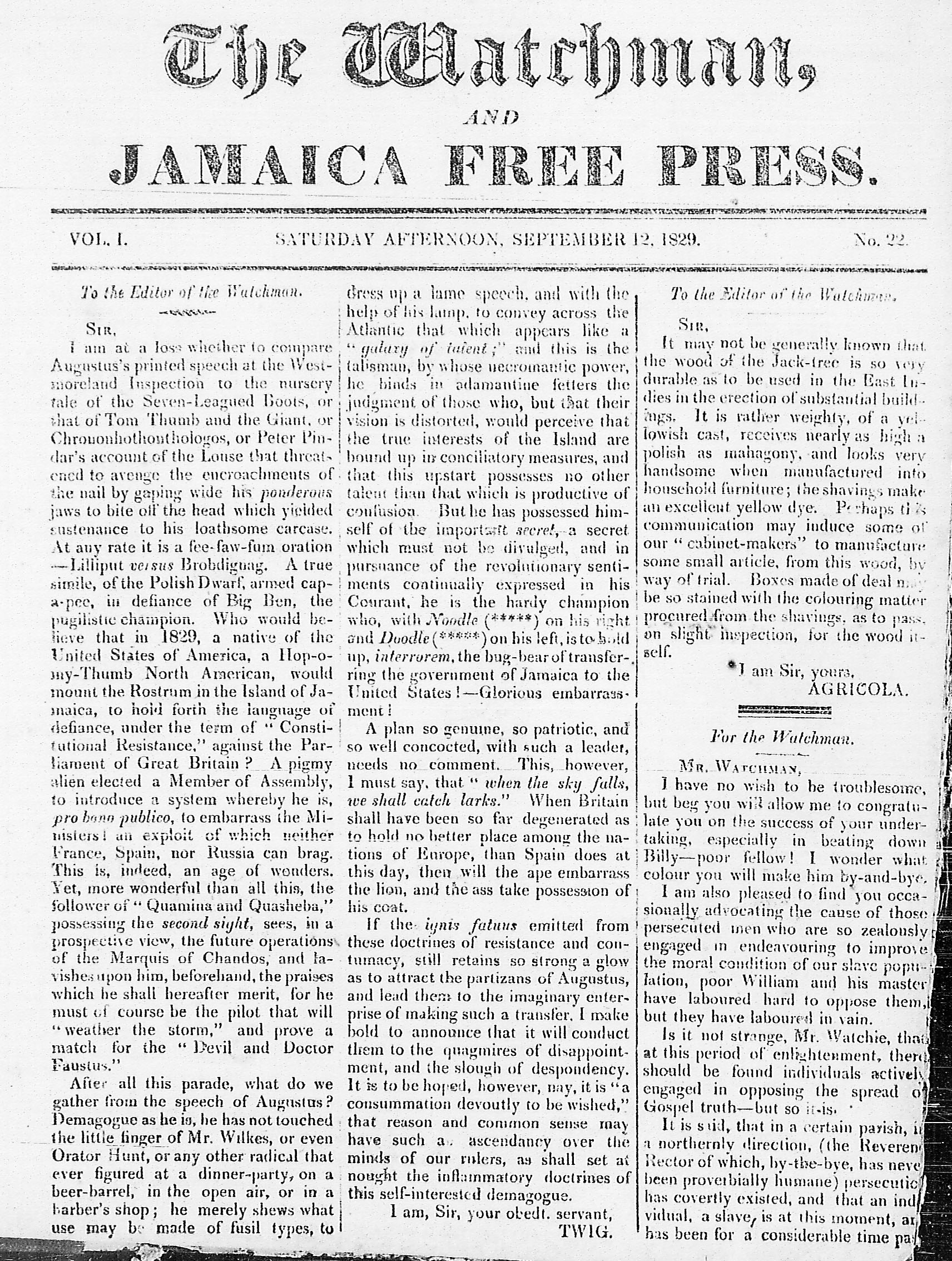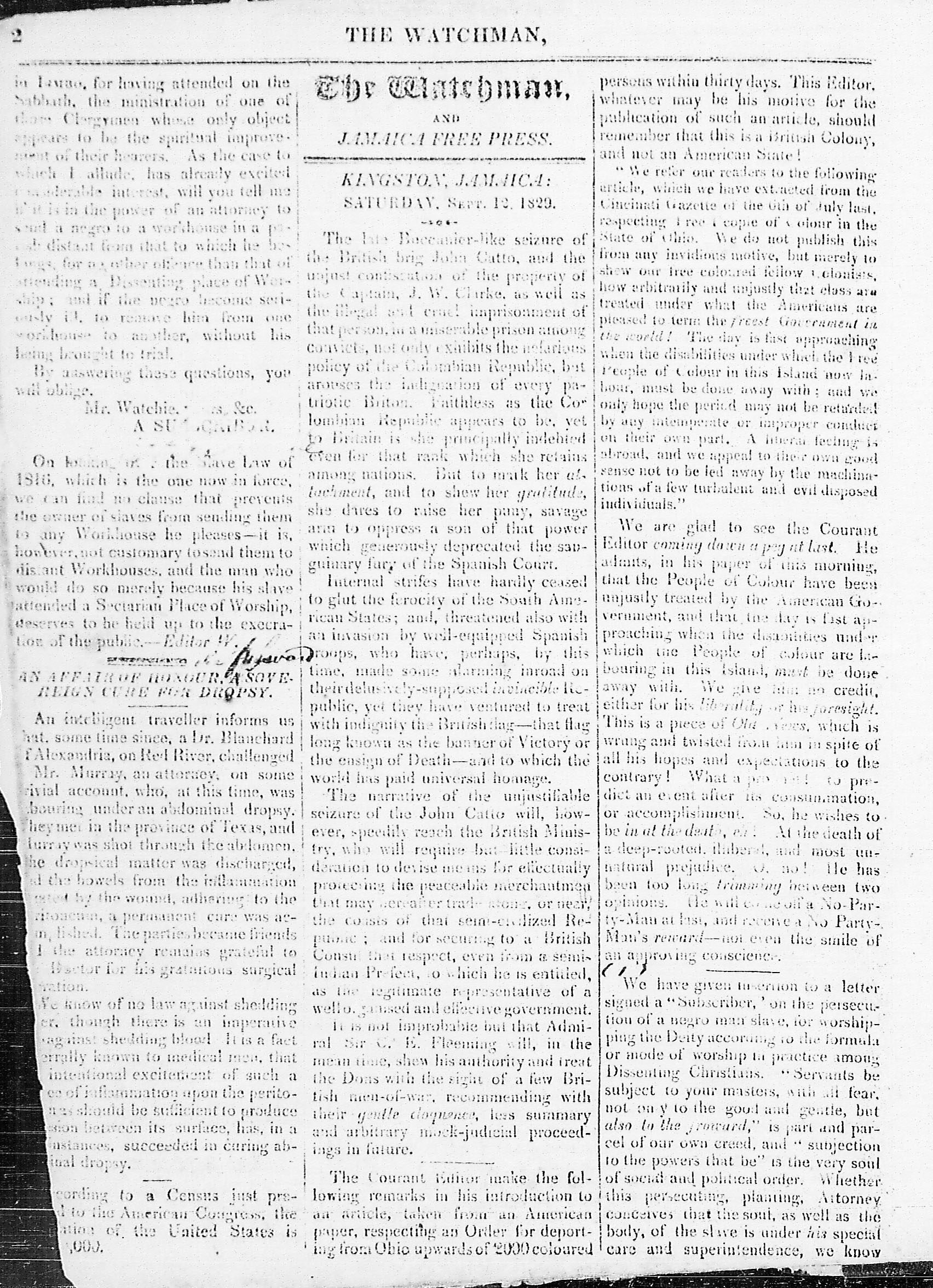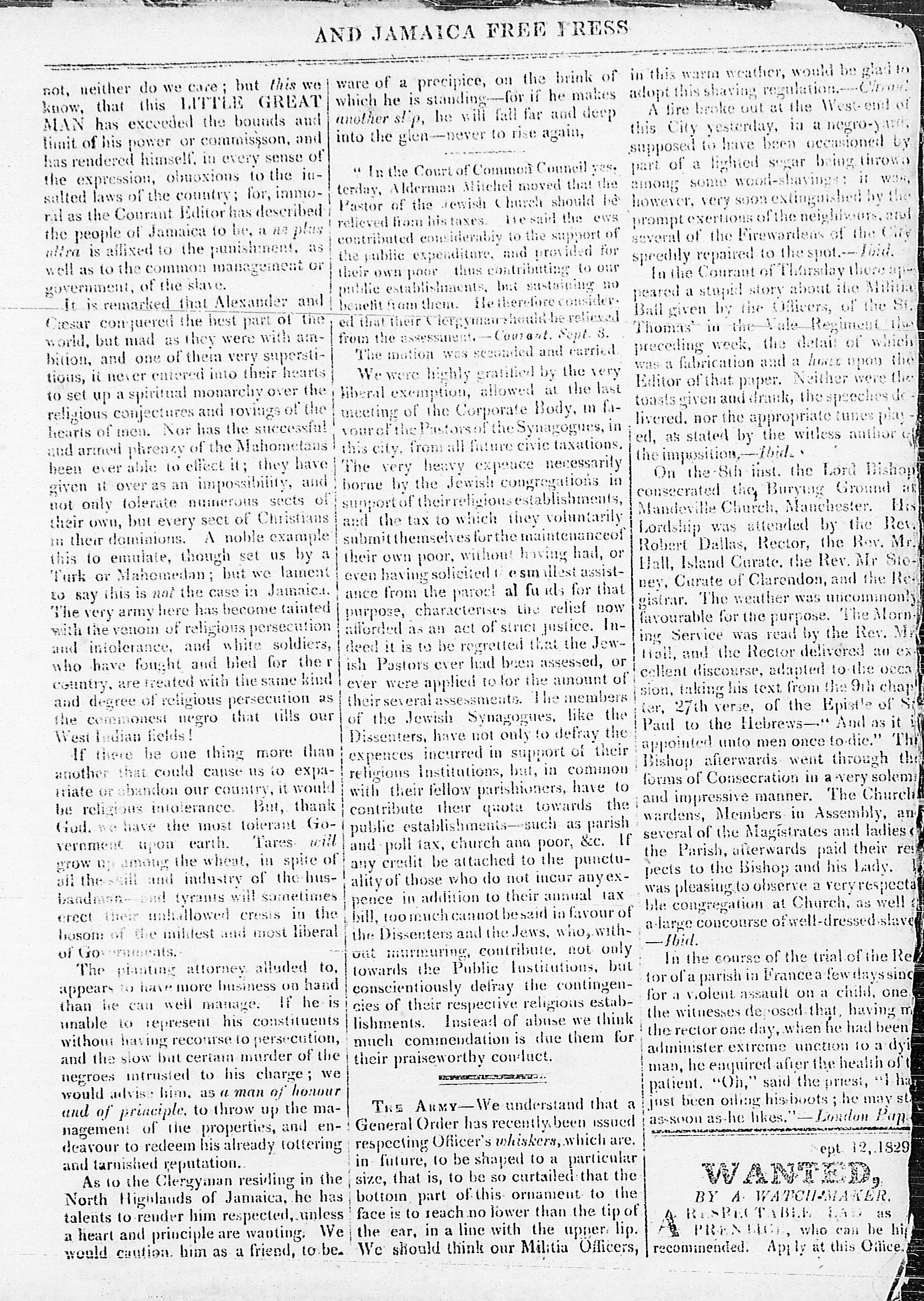Freedom of the Press
_________________________________________________________________________________________________

The third letter to the editor, seen at the end of the first page and the start of the second page, discusses the ethics of a slaveholder being able to send a slave away to a different Workhouse. This letter is the only one that the Editor addresses directly and debates shortly “A Subscriber.” This dialogue identifies the use of news as a platform to express and inform controversial opinions, representing the Watchman with a freedom of the press that was often censored in slave societies like Jamaica.1 The Editor argues that while it is not illegal by law to send a slave to a distant workhouse, it is not customary to do so, especially for reasons such as a slave going to a Sectarian Place of Worship, and thus deserved to be publicly criticized. According to the University of Cambridge, a workshop, or sugar house, in this context is a site of punishment that epitomized the brutality of enslaved people, and, for a time, also free black people.2 The importance of freedom of the press, especially in terms of black literature, is to keep consolidating one branch of information or opinion from gaining a monopoly over available news.
1. The Editors of Encyclopedia Britannica, “Jamaica: British Rule,” Encyclopædia Britannica. Accessed November 25, 2023, https://www.britannica.com/place/Jamaica/British-rule.
2. Jeff Strickland, “The Slave Workhouse (Chapter 2) – All for Liberty,” Cambridge Core, December 9, 2021, https://www.cambridge.org/core/books/all-for-liberty/slave-workhouse/53B83C88BEF4A8C8D591E46CF8027D2C.
Black Agency
_________________________________________________________________________________________________
Starting at the bottom of the second column of the second newspaper scan, the Watchman Editors discuss the new position of liberty that the Courant Editor seems to have taken up, which is the unjust treatment free peoples of colour have experienced under the American Government. Though the Courant Editor is “coming down a peg” with the realities of slavery and discrimination, the Watchman Editors exclaim that this is “Old News” and not a new foresight that they can take credit for. The Watchman Editors will not let the Courant’s long history of “trimming between two opinions” be forgotten and they certainly won’t let them receive a reward for a subject they should have been writing in support of long ago. The Watchman does not refrain from freely discussing and reporting about the discrimination both enslaved and free peoples of colour experience, and through their confrontational writing, they create an “oppositional public sphere.”3 This establishes diversity by going beyond the majority through challenging the typical anti-emancipatory stance many newspapers reported on within Jamaica. These newspapers were primarily written by pro-white planter editors and were the main audience that challenged the Watchman’s writing.4 By exposing the unjust principles written within print media, such as the Courant Editors ignorance, the Watchman disrupted the pro-slavery and discriminatory stance the majority of editors wrote about. They instead created a newspaper of black agency and free discourse that sought to uplift black voices.5
3. Candace Ward, “‘An Engine of Immense Power’: The Jamaica Watchmen and Crossings in Nineteenth-Century Colonial Print Culture,” Victorian Periodicals Review 51, no.3 (2018): 483. https://muse-jhu-edu.proxy1.lib.uwo.ca/article/705258/pdf.
4. Ward, “‘An Engine of Immense Power,'” 483.
5. Ward, “‘An Engine of Immense Power,'” 498.

Religion and Intolerance
_________________________________________________________________________________________________

On the third newspaper scan for Sept 12, 1829, the Watchman makes mention of the third letter again from the “Subscriber.” However, this part of the paper emphasizes the religious aspect of the conversation. The response from the newspaper references how Alexander the Great and Julius Caesar were both conquerors who never used spiritual monarchy or religious conjectures to control or inspire armies, then detailing that Jamaica is not like that: it is an intolerable country of different religions. The Jamaican army, the Watchman points out, has become heavily tainted with ideas of religious vigour, particularly towards the white men that fought alongside them, disputing the Subscriber’s argument that persecution for religious reasons is justified for a slave, or a black person, who attended a “Dissenting place of Worship” and actively oppose the spread of the Gospel truth. There is a comparable similarity between ethnic intolerance, behind religious ideology, which is noted by the Watchman itself. An article by Ann W. Nguyen wrote, titled “Religion and Mental Health in Racial and Ethnic Minority Populations: A Review of the Literature” describes how religion has been an important source of resilience for racial minorities like black communities.6 This suggests that Jamaica’s religious prominence could be a socially ingrained norm as well as a possible psychological defensiveness towards people who go against this important resilient hope. There is a potential that with Jamaica being a British colony this religious intolerance might be a learned trait from the colonizers, but, the Watchman notes that the intolerance would be the one reason why people would abandon the country.
6. Ann W. Nguyen, “Religion and Mental Health in Racial and Ethnic Minority Populations: A Review of the Literature,” Western libraries off-campus access to electronic resources, September 2020, https://go-gale-com.proxy1.lib.uwo.ca/ps/i.do?p=AONE&u=lond95336&id=GALE%7CA701053944&v=2.1&it=r.
